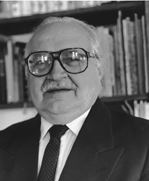
Dr. Kenneth R. Atkins, a professor of physics at Penn for 40 years, died on November 12 at the age of 75.
Dr. Atkins joined Penn in 1954 as an associate professor in charge of low temperature physics. He was promoted to full professorship in 1957 and served as acting chair of his department in 1966-67--a year in which he also served as director of the General Honors Program. He became professor emeritus in 1991.
Dr. Atkins took his Ph.D. from Trinity College, Cambridge, in 1948. After postdoctoral work as an I.C.I. fellow at Cambridge, he joined the faculty of the University of Toronto as an associate professor in 1951 and moved to Penn three years later. Here he published numerous papers and, in 1971, the widely-used textbook Physics, which was translated into German. He was also associate editor of the Physical Review, 1962- 64.
Students remember Dr. Atkins for his down-to-earth and entertaining demonstrations of physics in his courses, using ping-pong balls, for example, to demonstrate kinetic energy. His family remember him as an avid animal lover, and note that he leaves behind four poodles.
Dr. Atkins is survived by his wife, Kathleen; two sons, Rick and Brian; a daughter, Susan Quigley; three grandchildren and two great- grandchildren. Memorial contributions may be made to Chester County S.P.C.A. Ambulance Fund, 1212 Phoenixville Pike, West Chester, PA 19380.

The Brooklyn-born Dr. Goldstein earned his bachelor's and master's degrees in business administration from the City College of New York. After Army service in the 1940s, he worked as a record producer and music editor for Stinson, Folkways, Prestige, and Riverside. But late in the 'fifties he enrolled at Penn for an advanced degree, won a Fulbright Scholarship to Edinburgh University's School of Scottish Studies, and emerged as the first Ph.D. in Folklore and Folklife at Penn (1963). He joined the faculty immediately--and meanwhile helped to start the Philadelphia Folk Festival.
In 1967, he received the Lindback Foundation Award for Distinguished Teaching, and became chairman of the Folklore and Folklife department. Still later, in 1985, he became graduate chair of social gerontology here.
A recent Festshrift edited by Dr. Roger Abrahams, published just three weeks before Dr. Goldstein's death, praises him as an "unconventional scholar," who not only published books, monographs and scholarly articles but used all the media at his disposal, from annotated tapes, recordings, and magazine articles to book jackets and LP record liners as tools for teaching. He is also credited with redefining the mission of the field collector and, through his widely translated A Guide for Field Workers in Folklore, bringing collection and analysis together. He recognized that "the scientific process began in the field and before, and could not be delayed until the material reached the archive," as Dr. Dan Ben Amos put it.
His own fieldwork in England, Scotland, Australia, Newfoundland, Labrador and many other sites resulted in the production of some 525 long-playing records, which he produced and annotated as well as the publication of ten books and countless articles. He was honored by both scholarly and musical organizations, despite his claim that his "only instrument was the tape recorder." He had most recently received Philadelphia's first "Folky" and a special award from the Philadelphia Ceili Group for his contributions to Irish music.
Dr. Goldestein held eight editorships and led many organizations both academic and mainstreat: editor and president of Folklore Associates, president of Pastime Books, president of the American Folklore Society and the Pennsylvania Folklore Society, council member of The Folklore Society of England are but a few examples. He also advised the NEH and the Smithsonian.
He is survived by his wife, Rochelle, who frequently assisted him in his fieldwork and who was on the University staff for 18 years before her retirement as business administrator of the Institute for Contemporary Art. Also surviving are a brother; two sons, Scott Goldstein and Karl Levi; two daughters, Rhoda Goldstein and Diane Goldstein-Buchan; and two grandchildren.
Ed.Note: At presstime Almanac was also advised of the death of Dr. Paul Rodin Leberman of Medicine, whose obituary will appear in the next issue (December 5).
Almanac
Tuesday, November 21, 1995
Volume 42 Number 13